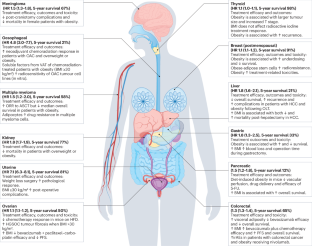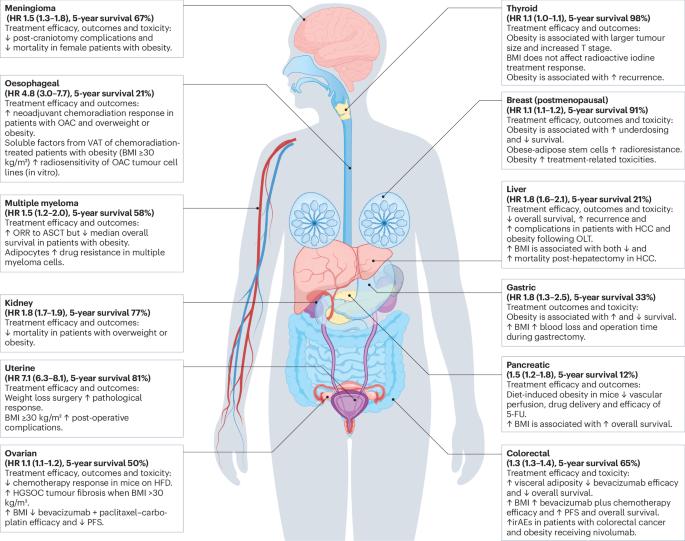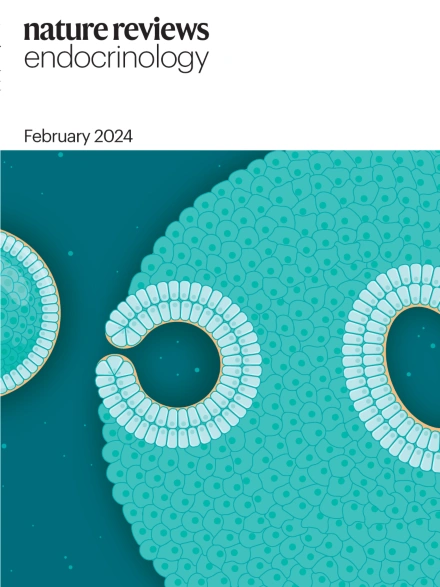The multifactorial effect of obesity on the effectiveness and outcomes of cancer therapies
IF 40
1区 医学
Q1 ENDOCRINOLOGY & METABOLISM
引用次数: 0
Abstract
Epidemiology studies have demonstrated a clear association between obesity and the development of several distinct malignancies, with excessive visceral adiposity being an increasingly prevalent feature in patients with cancer presenting for therapeutic intervention. Clinical trials and meta-analyses have helped to inform effective and safe dosing of traditional systemically administered anticancer agents in adult patients with cancer and obesity, but there remains much debate not only regarding the effect of obesity on the more novel targeted molecular and immune-based therapies, but also about how obesity is best defined and measured clinically. Low muscle mass is associated with poor outcomes in cancer, and body composition studies using biochemical and imaging modalities are helping to fully delineate the importance of both obesity and sarcopenia in clinical outcomes; such studies might also go some way to explaining how obesity can paradoxically be associated with favourable clinical outcomes in certain cancers. As the cancer survivorship period increases and the duration of anticancer treatment lengthens, this Review highlights the challenges facing appropriate treatment selection and emphasizes how a multidisciplinary approach is warranted to manage weight and skeletal muscle loss during and after cancer treatment. This Review outlines the multifaceted influence of obesity on cancer treatment effectiveness and associated toxicities, and explores complex issues, such as body composition and the obesity paradox, that link obesity with outcomes for patients with cancer.


肥胖对癌症治疗效果和结果的多因素影响
流行病学研究表明,肥胖与几种不同恶性肿瘤的发病有明显的关联,而内脏脂肪过多在接受治疗干预的癌症患者中越来越普遍。临床试验和荟萃分析有助于为传统的全身给药抗癌药物在肥胖的成年癌症患者中的有效和安全剂量提供依据,但对于肥胖对更新型的靶向分子和免疫疗法的影响,以及如何在临床上对肥胖进行最佳定义和测量,仍存在许多争论。肌肉质量低与癌症的不良预后有关,而使用生化和成像模式进行的身体成分研究有助于全面界定肥胖和肌肉疏松症在临床预后中的重要性;此类研究还可以在一定程度上解释为什么肥胖会与某些癌症的良好临床预后矛盾地联系在一起。随着癌症生存期的延长和抗癌治疗持续时间的延长,本综述强调了适当治疗选择所面临的挑战,并强调了在癌症治疗期间和治疗后如何采用多学科方法来控制体重和骨骼肌流失。
本文章由计算机程序翻译,如有差异,请以英文原文为准。
求助全文
约1分钟内获得全文
求助全文
来源期刊

Nature Reviews Endocrinology
医学-内分泌学与代谢
CiteScore
42.00
自引率
0.70%
发文量
158
审稿时长
6-12 weeks
期刊介绍:
Nature Reviews Endocrinology aspires to be the foremost platform for reviews and commentaries catering to the scientific communities it serves. The journal aims to publish articles characterized by authority, accessibility, and clarity, enhanced with easily understandable figures, tables, and other visual aids. The goal is to offer an unparalleled service to authors, referees, and readers, striving to maximize the usefulness and impact of each article. Nature Reviews Endocrinology publishes Research Highlights, Comments, News & Views, Reviews, Consensus Statements, and Perspectives relevant to researchers and clinicians in the fields of endocrinology and metabolism. Its broad scope ensures that the work it publishes reaches the widest possible audience.
 求助内容:
求助内容: 应助结果提醒方式:
应助结果提醒方式:


